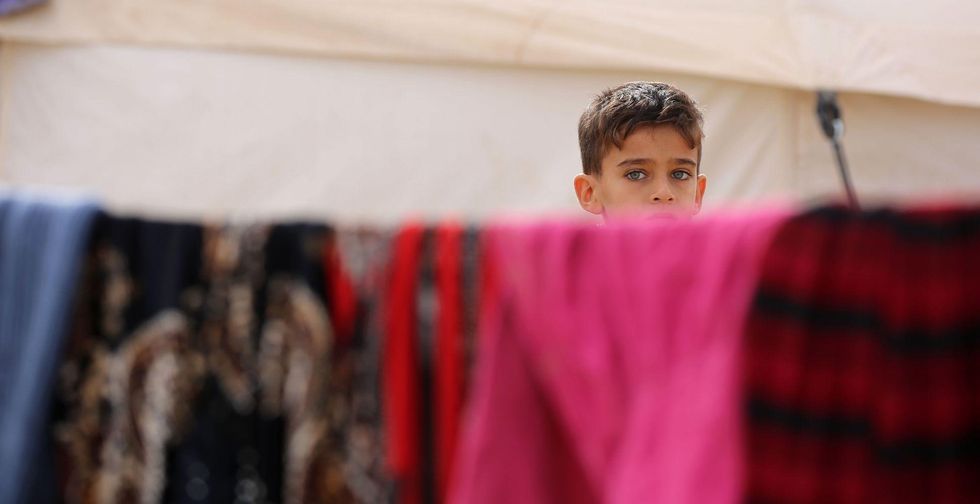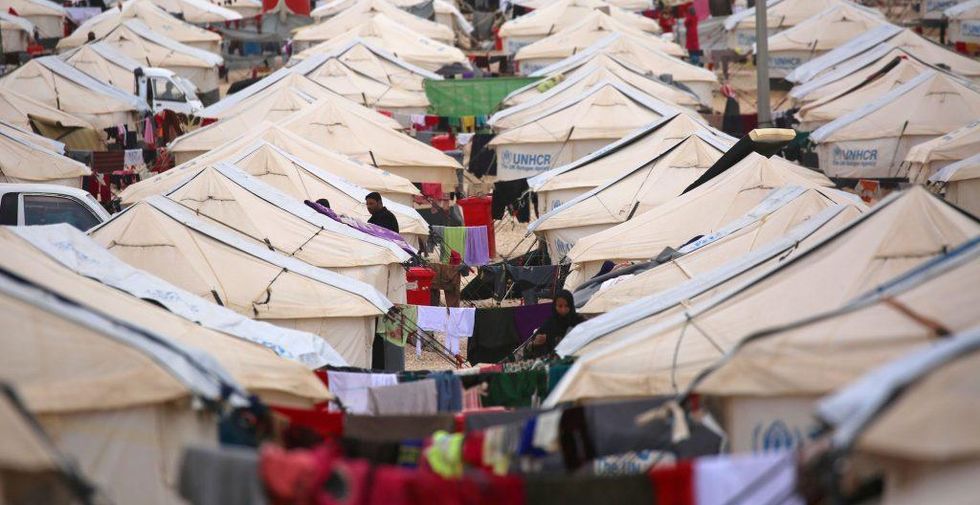
An Iraqi refugee boy, who fled the Iraqi city of Mosul due to the fighting between government forces' and ISIS, looks on at the U.N.-run al-Hol refugee camp in Syria's Hasakeh province on Dec. 5. (Delil Souleiman/AFP/Getty Images)

President Donald Trump is expected to roll out an executive order this week placing a 120-day moratorium on the United States' refugee admissions program, and the leader of one large evangelical humanitarian organization is pushing back.
Scott Arbeiter, president of World Relief, one of the few Christian organizations approved by the U.S. government to resettle refugees into the country, told TheBlaze that the order would "limit our ability to fulfill" a mandate from Jesus to "care for the least of these," a reference to Jesus Christ's words in Matthew 25:40.
Should the president move forward with the executive order, as it is reported by the New York Times, the decision would not only tighten security on the current process, it would also halt the resettlement of refugees into the country for four months while a review of the current screening procedure is conducted and includes a significant cut in the number of refugees resettled in the U.S. this year.
When it starts up again, the original program's goal — intended to bring 110,000 refugees into the U.S. — would be halved, offering refuge to only 50,000 people, a move that could significantly stall the momentum NGOs have established in their work with refugees.
With the freeze, Trump is partially following through with a campaign promise of a "total and complete shutdown" of Muslims entering the United States "until our country's representatives can figure out what the hell is going on."
And during a sit-down with ABC News' David Muir that aired Wednesday evening, Trump, discussing the potential refugee program changes, said, "We're going to be do extreme vetting in all cases, and I mean extreme."
But Arbeiter, for his part, believes the president's thinking on the matter is wrong.
"What I think is, as the Trump administration does the work they've committed themselves to do, they're going to find that there really has been great care taken," he said of the current process for screening refugees. "They may discover places where they want to add additional measures; I don't know where they might find that."
"I do think that they will be pleasantly surprised by the rigors of the process that are there," he continued. "They have earned the right to review and refine that process — we support that. We just think that the four-month moratorium is an answer beyond the scope of the question."

As it stands, the refugee program, which has been in place since the 1970s and has accepted more than 3 million people fleeing persecution, is equipped with some stringent procedures, something Arbeiter said he values.
All refugees, for example, are subject to strict background checks by the Department of Homeland Security prior to entering the U.S. and potential refugees are processed in conjunction with nine nonprofit organizations, such as World Relief, and not solely by the government.
In addition, following weekly meetings about who will be accepted between the State Department and the non-governmental organizations, the refugees are sent all over the U.S. and are required to repay the cost of their flight into the country and apply for jobs once here.
"We disagree [with] the notion that security and compassion are mutually exclusive and that the only way to address security is to completely close down the program for four months," Arbeiter said.
An unintended consequence of Trump's executive order, the World Relief president highlighted, is the damage it would likely do to the infrastructure of NGOs currently aiding refugees. When there no refugees to aide, Arbeiter said, there is concern that organizations like his would be forced to "dismantle significant infrastructure, including expertise and experience gained over decades" because many specialists can't afford to wait four months for work that may or may not return.
In Arbeiter's mind that shouldn't even be an option.
"I wonder sometimes if our grandchildren will ask us what some of us asked our grandparents," he pondered, recalling the Jews who were seeking refuge from Nazi Germany in the 1930s. "Our children and grandchildren may ask of us: 'What did you know and what did you do in the worst humanitarian crisis in history?'"
"'Did you walk courageously and with compassion and with appropriate care for security,'" he continued, "'or did you simply close the doors?'"
Arbeiter, who wrote last year that it is "America's duty" to accept refugees and that Syria's children "are the world's responsibility," told TheBlaze that World Relief has written to the Trump administration, offering to collaborate with the president as he considers retooling the current refugee process.